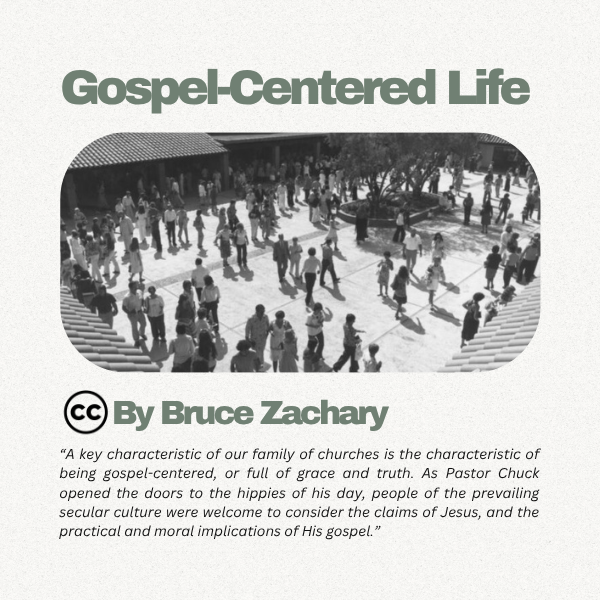
As a Calvary Chapel, our family of churches was at the center of the Jesus Revolution of the late 1960s and 1970s, the last great revival to sweep across this country and globe. A key characteristic of our family of churches is the characteristic of being gospel-centered, or full of grace and truth. As Pastor Chuck opened the doors to the hippies of his day, people of the prevailing secular culture were welcome to consider the claims of Jesus, and the practical and moral implications of His gospel. This radical culture is part of our past, present, and Lord willing, future. So, what is a gospel-centered life, and what difference does it make?
What is a gospel-centered life?
1. You are saved by grace through faith (Eph. 2:8-9).
Salvation is a gift from God. We are saved by grace through faith in Christ (Eph. 2:8-9). Grace means that our salvation is a gift (unmerited). You receive Jesus through believing that He is the Christ and choosing to yield your life to His authority and seeking to follow Him (Lu. 9:23). C.S. Lewis, in a symposium on world religions, observed that what distinguishes biblical Christianity from other religions and worldviews is the gospel of grace. Every other worldview has mankind trying to merit through (moral) performance attainment to a perceived heaven.
Your acceptance in the family of God is conditioned upon faith in Christ, not your moral performance.
2. A gospel-centered life is motivated to please God since they have been accepted, not to gain acceptance (Eph. 2:10).
A gospel-centered life is motivated to please God, and desires to learn, love, and live God’s instruction because they have discovered God’s boundaries are all to benefit not burden believers and their communities.
3. A gospel-centered life finds value primarily in Christ (Eph. 1:1-6).
We tend to think that our rightness with God and value to Him are based on what we do or do not do for God. Thus, we tend to evaluate ourselves and others based on perceived performance (works). Performance-based assessments of self and others will result in pride and self-condemnation. God’s blessings in this life are not conditioned upon my moral performance (e.g., God does not owe me because I read my Bible, pray, give, serve, or share my faith). Similarly, when I am not performing well, I am no less valued in Christ. In Christ, we are recipients of unmerited favor and undeserved acceptance.
What difference does it make?
The gospel is the point of the whole Bible. The gospel implications are profound …
1. Gospel-centered communities have Jesus and His gospel as their focus.
The gospel creates new kinds of communities. The gospel is countercultural: frees from cultures of criticism, guilt, self-righteousness, condemnation, the desire to impress, control, compete, and dominate that is the prevailing culture of the world. Gospel-centered people forge gospel-centered communities to display the beauty of Christ. The root meaning of grace is beauty, and the gospel is how the Church displays the beauty of Christ!
Counterfeits to Christ and His gospel are moralism, focusing on man’s good deeds (works); self-helpism, focusing on your efforts to improve yourself apart from Christ’s transforming work; relativism that truth is self-determined; and activism that seeks social change without spiritual transformation.
2. Gospel-centered community is full of grace and truth (Jn. 1:14).
Truth without grace is harsh and ugly. Grace without truth is weak and sentimental. Gospel culture characterized by truth (sound doctrine) and grace (compassion) is powerful because the gospel is power (Rom. 1:16). People need to know that they are welcome to consider the claims of Jesus and His gospel, and their acceptance is based on grace through faith. A gospel-centered community knows that over time, in a compassionate loving environment where truth is taught, attitudes and actions will be transformed by God’s word and Spirit.
If we could read one another’s minds, we would be repelled by how contrary to God our thoughts can actually be. Any other view is pretense. Accordingly, we all need compassion without compromise — full of grace and truth!
3. The local church is a unique garden to cultivate gospel-centered community, but the fruit must be displayed beyond Sunday.
Our friendships, marriages, families, work or school, and community should be characterized by grace and truth, compassion without compromise. We should not ignore performance, moral or otherwise, but grace and truth must transcend. Thus, I must be willing to consider whether my friends, spouse, children, fellow workers or students, and neighbors think that I am gracious and compassionate. Are we willing to ask them whether we are making progress?
4. A gospel-centered life is characterized by hope and rest for the soul (Mt. 11:28-30, Ac. 15:10).
The gospel is based on God’s love to the undeserving. Every other hope is based, either expressly or implicitly, on how deserving we are. Trying to be worthy of God’s love (or anyone’s love) by having to earn it by your performance is exhausting, unsatisfying, and does not provide meaningful hope, nor rest for your soul. On the other hand, a gospel-centered life is characterized by hope and peace (rest for the soul) because it relies upon Jesus and what He has done and all that God has promised that is not dependent upon you and me. Yet, God invited you and me to participate in order to experience the joy of gospel-centered life.







